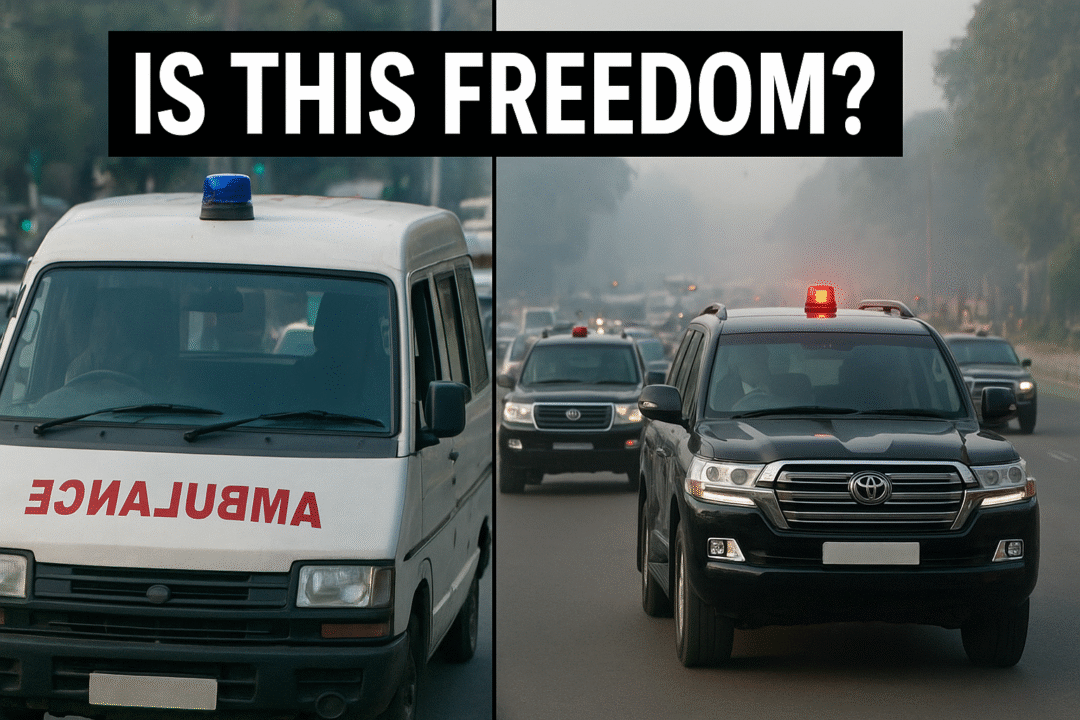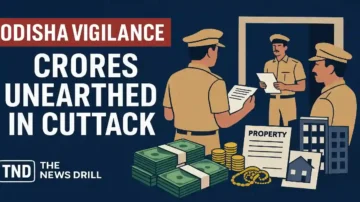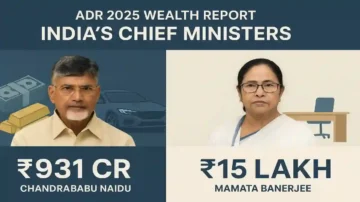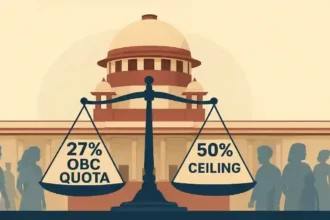- Two-decade review links VIP convoys and protocols to multiple deaths nationwide.
- Cases span 2004–2025: convoy crashes, ambulance delays, stampedes.
- Recent incidents include Jodhpur 2025, Jaipur 2024, Gonda 2024, Meghalaya 2024–25.
- Governments across parties pledged reforms; VIP practices persisted.
- Calls grow for right-of-way laws, SOPs, and independent probes.
Introduction: When Privilege Kills
“Every Person Is Important,” Prime Minister Narendra Modi declared in 2017, announcing the ban on red beacons. Yet in August 2025, in Jodhpur, Rajasthan, 12-year-old Lokendra Singh lost his life when a dumper truck collided with his motorcycle near a route cleared for Independence Day celebrations. His grieving family alleged officials assaulted them when they protested.
- Introduction: When Privilege Kills
- Chronological Timeline of Fatal VIP Incidents (2004–2025)
- 2004–2010: Early documented deaths
- 2011–2016: Repeat tragedies across states
- 2017: Beacon ban, but business as usual
- 2019–2025: A decade of hypocrisy and escalation
- Official Statements and Responses
- Public Reactions
- Background and Context
- Analysis
- Recommendations
- Key Takeaways
- FAQs
This is not an isolated incident. From ambulances trapped for convoys, to convoy vehicles mowing down citizens, to stampedes caused by VIP access routes, India’s VIP culture has left behind a grim trail of casualties.

Chronological Timeline of Fatal VIP Incidents (2004–2025)
2004–2010: Early documented deaths
2004 – Bihar (Kishanganj): Union Minister Mohammed Taslimuddin’s motorcade ran over 10-year-old Rajib Chohan. Villagers protested; compensation was later announced.
2006 – Haryana: NSG commando Surendra Kumar died escorting ex-CM Bhajan Lal’s convoy.
2009 – Hyderabad: A patient died after an ambulance was delayed due to CM YSR Reddy’s convoy.
2010 – Delhi: Heart patient Anil Jain died after his ambulance was stuck for PM Manmohan Singh’s convoy. Police denied responsibility; family blamed delay.
2011–2016: Repeat tragedies across states
2013 – Patna (Gandhi Maidan): Stampede at a political rally with VIP security killed 33. Poor crowd management linked to VIP arrangements.
2014 – Delhi: Woman died after ambulance blocked during convoy movement.
2016 – Uttar Pradesh: Pregnant woman died after getting stuck in VIP traffic jam.
2017: Beacon ban, but business as usual
Modi government banned red beacons, calling it the “end of VIP culture.” Yet incidents of ambulances being blocked continued, proving cosmetic reforms weren’t enough.
2019–2025: A decade of hypocrisy and escalation
2019 – Alwar, Rajasthan
Escort vehicle in RSS Chief Mohan Bhagwat’s convoy hit a motorcycle, killing 6-year-old Sachin Yadav. His grandfather was critically injured.
2021 – Lakhimpur Kheri, Uttar Pradesh
Convoy linked to Union MoS Ajay Mishra Teni ran over farmers protesting. Four farmers and a journalist died. Mishra’s son Ashish was arrested, sparking nationwide outrage.
2022 – Lucknow, Uttar Pradesh
Pregnant woman died after her ambulance was delayed by CM Yogi Adityanath’s convoy.
2023 – Churu, Rajasthan
Six policemen died in a collision while on VIP duty for PM Narendra Modi’s rally.
2024 – Jaipur, Rajasthan
An escort vehicle in CM Bhajan Lal Sharma’s convoy was struck by a taxi. ASI Surendra Singh died; several injured.
2024 – Gonda, Uttar Pradesh
SUV in BJP MP Brij Bhushan Sharan Singh’s son’s convoy struck a bike, killing Rehan (17) and Shehzad (24).
2024 – Umiam, Meghalaya
Escort vehicle in Tourism Minister Paul Lyngdoh’s convoy killed biker Hudderfield Rymbui.
2025 – Jodhpur, Rajasthan (Independence Day)
12-year-old Lokendra Singh died when a dumper truck struck his bike on the way to I-Day celebrations. Family alleged intimidation by officials when they protested.
2025 – Bihar (Rahul Gandhi’s convoy)
Police constable allegedly run over during “Vote Adhikar Yatra.” BJP condemned; Congress silent.
2025 – Meghalaya (Nongpoh)
Year-old milkman Jonga Bahadur Sunar run over by an Assam Rifles convoy.
2025 – Andhra Pradesh (Sattenapalli)
Cheeli Singaiah (55) fatally struck during Y.S. Jagan Mohan Reddy’s convoy. Police filed case for culpable homicide.
Official Statements and Responses
2017 Beacon Ban: Modi declared, “VIP culture is finished.” Yet within months, ambulances continued to be blocked for convoys.
State CM responses: Rajasthan and UP governments offered compensation in several deaths (e.g., Jodhpur 2025: ₹11 lakh announced), but families allege systemic neglect.
Judicial oversight: Supreme Court intervened in Lakhimpur Kheri, ordering independent monitoring of investigations.
Public Reactions
On Reddit and X, citizens voice daily frustration:
“Every other day JLN Marg and Tonk Road are jammed for VIPs. BJP was supposed to end this.” (Reddit Jaipur, Jan 2025)
“An ambulance was stopped to let LG Manoj Sinha’s convoy pass… Who’s accountable if the patient dies?” (Reddit Jammu, Feb 2025)
Background and Context
VIP culture in India is rooted in colonial hierarchy: beacons, convoys, and special privileges signifying separation from citizens. Post-independence, all major parties inherited and expanded the practice. The 2017 beacon ban was symbolic, but real issues — ambulance obstruction, convoy recklessness, diversion of police resources — remain untouched.
Analysis
By Himanshu Singh:
Every ruling party has promised to end VIP culture. BJP made it an election issue in 2014, Congress governments had pledged it earlier, and regional parties echo the same rhetoric. Yet data from 2004–2025 shows the culture persists, killing citizens across states and regimes.
Patterns emerge:
Ambulance Delays: Critical patients dying because convoys block traffic (Delhi 2010, Lucknow 2022, Patna 2021).
Convoy Collisions: Reckless or speeding VIP escorts causing deaths (Alwar 2019, Gonda 2024, Meghalaya 2024).
Stampedes: Poor crowd control linked to VIP routes (Patna 2013, Prayagraj 2025).
Administrative Disruption: Hospitals focusing on VIP visits instead of patients (Patna 2021).
The conclusion is stark: this is not about one party. VIP culture is systemic, institutional, and bipartisan.
Recommendations
Right of Way Law: Criminalize obstruction of emergency vehicles.
Independent Inquiries: Mandatory judicial probe for any death linked to VIP convoys.
National SOP: Uniform rules to minimize roadblocks and prioritize ambulances.
Technology: Emergency Vehicle Preemption (EVP) to clear routes for ambulances, not VIPs.
Key Takeaways
VIP culture kills — it is not symbolic.
Every party is guilty of maintaining it.
Citizens continue to suffer — from blocked ambulances to fatal convoy crashes.
Real reform requires law, not optics.
This story should be updated live whenever a new VIP-linked fatality occurs. Recommend creating a live blog (“Tracking VIP Culture Incidents”) for elections and Independence/Republic Day events.
FAQs
Q1: Has VIP culture really killed people in India?
Yes. From children in Bihar and Rajasthan to farmers in UP, multiple lives have been lost.
Q2: Did the 2017 beacon ban end VIP culture?
No. Symbolic beacons disappeared, but convoys, escorts, and roadblocks remain.
Q3: Which parties are responsible?
All — BJP, Congress, JDU, regional parties. No party has ended the practice.
Q4: What does the law say?
Currently, no strong national law protects ambulances from convoy priority.
Q5: What reforms are needed?
Right-of-way for ambulances, strict convoy SOPs, judicial accountability.

















